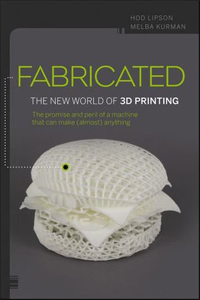Book offers broad view of 3-D printing's future
By Anne Ju

“What would you make if you had a machine that could make anything?” begins a chapter in a new book by Cornell’s Hod Lipson and Melba Kurman ’89. The book explores the promises – and perils – of a technological revolution: 3-D printers that can quickly and cheaply make anything from bicycle parts to low-fat foods.
The book, “Fabricated: The New World of 3D Printing” (Wiley Publishing), is co-authored by Lipson, associate professor of mechanical and aerospace engineering and computer science, and Kurman, an author, blogger and technology analyst.
The book, the authors say, provides practical and imaginative insights to the question, “How will this technology change my life?"
The manufacturing world and “business as usual” are sure to be disrupted as regular people gain access to powerful, inexpensive tools of design and production, they say. Olympic sprinters will run in custom-printed shoes designed to fit their individual foot shapes and gaits. NASA will print metal parts for Mars rovers. At home, families will print foods using cartridges preloaded with recipes from around the world.
When they started writing the book a year ago, Lipson and Kurman decided not to produce just another technical book or user’s manual about 3-D printing. Instead, they aimed for a broader audience: readers who like books on business strategy, popular science and novel technology. Later chapters explore future applications of 3-D printing and the economic disruption that could be induced by shortened supply chains and low-cost customization.
“Fabricated” does not ignore the hidden perils of rapid technological leaps forward. The chapter titled “Ownership, safety and new legal frontiers” goes into the legal and ethical challenges raised by 3-D printing and related technologies. For example, copyright – already rendered nearly invalid by digital media – will be once again be challenged by 3-D printing technology. It’s possible now to 3-D print working gun parts made out of plastic.
And as researchers hone procedures to 3-D print living stem cells, medical ethics will face new challenges.
Get Cornell news delivered right to your inbox.
Subscribe